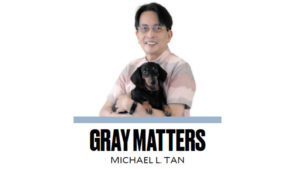In 2018, Josue Eclar from San Manuel, Isabela, passed through the Pura-Gerona entrance of the newly constructed Tarlac-Pangasinan-La Union Expressway (TPLEx). He chanced upon the Eclar compound of Mayor Eloy Eclar of Gerona. There was a large sign that said “Eclar” in the building along the road. He was so curious he stopped and sought members of the Eclar clan. Luckily, he was led to an elder of the clan, Felixberto Eclar Jr. Joe took the opportunity to invite Felixberto and other Eclars to attend an Eclar clan reunion in San Manuel, Isabela, a few weeks hence.
Attending that reunion was a leap of faith. There was some wariness, knowing how many Filipinos started having surnames only after Spanish governor general Narciso Claveria decreed in 1849 that Filipinos should adopt Christian names and surnames to establish a “civilized” identity, facilitate administration of the colony, as well as control migration and tax evasion.
But Joe’s invitation was too good to pass up. It was time to find out whether the Isabela Eclars and the Tarlac Eclars were related. I flew from Manila to Isabela to attend that reunion, to join the other Eclars from Tarlac. We were treated like long-lost relatives. We found the Isabela Eclars to be such a large, well-organized clan, and fun to be with.
We from Tarlac were expecting to learn at best that the Isabela Eclars also came from the Ilocos. But they told us that their clan came from Pura, Tarlac! The oldest living Isabela Eclar, Catalino “Doming” Eclar, now 91, told us that his father said he had a cousin in Pura, Tarlac, named “Immo.” He must have been referring to my maternal grandfather, Guillermo Eclar.
Last Jan. 27, Saturday, it was the turn of the Eclar Clan of Pura to host a reunion. This was to be the biggest and most inclusive reunion. When we finally held the reunion, we were amazed at the enthusiasm of our “kabagyans” (relatives) from Isabela. They promised 120 would attend from San Manuel, Isabela, and 20 from Cauayan and Quirino. Indeed, they were true to their word. About 150 of them came to Pura, Tarlac. This meant they left Isabela at midnight, arriving in Pura, Tarlac, for the reunion registration that started at 8 am. There were 200 Eclars from Pura, and so we had an actual count of 347 attendees.
The reunion was a crisp five-hour program, formally starting at 10:30 a.m. and ending at 3:30 p.m. But there was no lull or boring moment. There was a sharing of untold stories by the living elders about their lives. The youth on both sides came meticulously prepared to render modern and folk dances, singing, and dancing. To the delight of the participants, there were so many prizes to raffle off. There was so much generosity among the Eclar families from Tarlac and Isabela that I restrained myself from using this as a forum to thank them.
I saw the reunion as a Thanksgiving. There was demonstrable progress in the family lives of the Eclars of Pura and Tarlac, evident from the mien of the youth—respectful, engaged, and confident. Such a contrast. Domingo tells the story that, at a time of severe hardship, their branch of the clan decided to relocate to Isabela where they learned there was bountiful land. He said it took them a month to reach what later on was the town of Callang, later renamed San Manuel.
The reunion showcased individual, family, and clan progress, no matter how unreliable the national governance and development environment might have at times been. But there were no egos, no one-upmanship, only genuine camaraderie and kinship. The reunion extolled the Filipino spirit. It started with a robust singing of the national anthem and ended with all participants holding hands in a mammoth circle to solemnly sing “Bayan Ko.” I had goosebumps at this moment.
I feel some calmness writing this column about family and local color. It is a welcome respite from the hysterical phase of the nation acting like a cockpit arena where people shout, sa “pula, sa puti!” except that they might as well be saying, “kay Bongbong, kay Digong!” Filipinos have no time or passion for issues in their neighborhoods and cities, but they will have time to take up partisan positions on national issues. We have become so diametrically fragmented it is hardly imaginable that we constitute one large family. May we learn to be the change we seek.
doyromero@gmail.com


